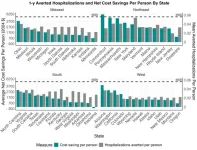(Press-News.org) Smoking continues to rank as the foremost preventable cause of premature death. In a paper published this week in the Proceedings of the National Academy of Science (PNAS), Harvard researchers report findings that evoking feelings of gratitude in people who smoke helps reduce their urge to smoke, and increases their likelihood of enrollment in a smoking cessation program. They note that these findings could inform newer approaches to public health messaging campaigns that aim to reduce so-called “appetitive” risk behaviors like smoking, drinking, and drug use.
The research team built on the Appraisal Tendency Framework, a theoretical model of emotiona and decision making, and earlier experimental studies on the connection between emotions and risk behaviors to hypothesize that sparking the specific positive emotion of gratitude could drive reductions in smoking. Previous meta-analyses had concluded that positive emotion has no effect on these types of behaviors.
"The conventional wisdom in the field was to induce negative emotions in anti-smoking campaigns," said lead researcher Ke Wang, Harvard Kennedy School PhD 2024. "Our work suggests that such campaigns should consider inducing gratitude, a positive emotion that triggers cascading positive effects."
Through a series of multi-method studies, the researchers found consistent evidence that inducing feelings of gratitude was associated with lower rates of smoking behavior. Nationally representative surveys in the U.S. and a global sample found that higher levels of gratitude correlated with a lower likelihood of smoking, even after accounting for other known drivers of smoking. Experimental studies further demonstrated causality. Inducing feelings of gratitude in adults who smoke significantly reduced their self-reported craving to smoke, whereas inducing compassion or sadness did not have these beneficial effects. Critically, inducing gratitude also increased participants' enrollment in an online smoking cessation program, showing effects on actual quit-smoking behaviors.
These findings create opportunities to re-think the scientific foundations of anti-smoking campaigns. The investigators examined the largest federally funded anti-smoking public service campaign, Tips from Former Smokers, by the Centers for Disease Control and Prevention. Unfortunately, this landmark campaign has seldom induced gratitude. Instead, it has most often induced emotions of sympathy, sadness, and compassion – three emotions that may not produce intended effects on smoking cessation behaviors. In the case of sadness, earlier research by the research team found that evoking sadness actually increased desire to smoke, as well as the intensity with which smokers inhale immediately after the emotion is triggered.
“Compared to how much money tobacco companies spend on advertising, public health campaigns have paltry budgets; they need to make the most of every dollar” according to Professor Jennifer Lerner. “The theoretically-grounded and empirically-tested framework presented here will hopefully help public health officials design more effective public media campaigns across a broad spectrum of appetitive risk behaviors that have underlying emotional components.”
Unlike other positive emotions (e.g., happiness, compassion, and hope), gratitude has the unique quality of making people less inclined toward immediate gratification and more focused on long-term relationships and health. The research team posits that this unique effect is related to the emotion’s influence on smoking behaviors and desires to quit. The researchers believe designing public health messaging campaigns to more effectively induce gratitude could help them have greater impact on reducing smoking rates and other risky health behaviors.
The paper was authored by:
Ke Wang, 2024 PhD graduate, Harvard Kennedy School, Harvard University (as of July 1, 2024 will begin a postdoctoral fellowship at the University of Virginia);
Vaughan W. Rees, Senior Lecturer on Social and Behavioral Sciences, Center for Global Tobacco Control, Harvard T.H. Chan School of Public Health, Harvard University;
Charles A. Dorison, Assistant Professor of Management, McDonough School of Business, Georgetown University (former PhD student and postdoctoral fellow at Harvard Kennedy School);
Ichiro Kawachi, John L. Loeb and Frances Lehman Loeb Professor of Social Epidemiology, Harvard T.H. Chan School of Public Health, Harvard University;
Jennifer S. Lerner, Thornton Bradshaw Professor of Public Policy, Decision Science, and Management, Harvard Kennedy School, Harvard University
Interviews with or quotes from the authors are available upon request.
END
Harvard researchers find that gratitude is a useful emotional tool in reducing desire to smoke
Key implications for public health campaigns
2024-07-01
ELSE PRESS RELEASES FROM THIS DATE:
Researchers disclose the effect of social media use on the mental health of college students during the pandemic
2024-07-01
The COVID-19 pandemic had an unprecedented effect on college students’ mental health: symptoms like anxiety and major depression in young adults ages 18-25 increased significantly compared to before the pandemic.
A new study from researchers at the University of North Carolina at Chapel Hill looks at a possible contributing factor to the worsening trends in mental health: social media.
We know that college students and adolescents are using social media more. Last May, the US Surgeon General issued an advisory on social media and youth mental ...
July Issues of APA Journals cover new research on pharmacogenomics, ADHD medication use, associations between mental health and cardiometabolic complications later in life, and more
2024-07-01
WASHINGTON, D.C., July 1, 2024 — The latest issues of four American Psychiatric Association journals, The American Journal of Psychiatry, Psychiatric Services, American Journal of Psychotherapy and Psychiatric Research and Clinical Practice are now available online.
The July issue of The American Journal of Psychiatry brings together research on affective disorders, pharmacogenomics, and psychiatric illness-related cardiometabolic problems. Highlights include:
• Genome-Wide Association Study of Treatment-Resistant Depression: Shared Biology With Metabolic Traits.
• Pharmacogenomic Clinical ...
Most climate-vulnerable countries with highest hunger rates significantly under-represented in agrifood research
2024-07-01
The most climate-vulnerable countries with the highest hunger rates are significantly under-represented in agrifood research – sparking a need for urgent action and increased investments to redress this imbalance, a major new study has found.
The ‘State of the Field for Research on Agrifood Systems’ report, published by The Juno Evidence Alliance – a partnership of CABI, Havos.Ai and the University of Notre Dame, USA – found that only one out of eight research papers is led by scientists from ...
UMD researchers develop new and improved camera inspired by the human eye
2024-07-01
A team led by University of Maryland computer scientists invented a camera mechanism that improves how robots see and react to the world around them. Inspired by how the human eye works, their innovative camera system mimics the tiny involuntary movements used by the eye to maintain clear and stable vision over time. The team’s prototyping and testing of the camera—called the Artificial Microsaccade-Enhanced Event Camera (AMI-EV)—was detailed in a paper published in the journal Science Robotics in May 2024.
“Event cameras are a relatively new technology better at tracking ...
Self-assembling, highly conductive sensors could improve wearable devices
2024-07-01
UNIVERSITY PARK, Pa. — To advance soft robotics, skin-integrated electronics and biomedical devices, researchers at Penn State have developed a 3D-printed material that is soft and stretchable — traits needed for matching the properties of tissues and organs — and that self-assembles. Their approach employs a process that eliminates many drawbacks of previous fabrication methods, such as less conductivity or device failure, the team said.
They published their results in Advanced Materials.
“People have been developing soft and stretchable conductors for almost a decade, but the conductivity ...
Lab values predict periprosthetic joint infection in patients with morbid obesity
2024-07-01
Waltham — July 1, 2024 — For patients with severe obesity undergoing knee or hip replacement, commonly obtained laboratory values – including markers of anemia and inflammation – are independent predictors of the risk of periprosthetic joint infection (PJI), reports a study in The Journal of Bone & Joint Surgery. The journal is published in the Lippincott portfolio by Wolters Kluwer.
Hemoglobin level, platelet count, and several markers of systemic inflammation may be relevant to the elevated ...
Study suggests states could cut healthcare costs by delivering patient tailored meals
2024-07-01
Chicago (July 1, 2024) — According to new research looking at every U.S. state, programs that deliver medically tailored meals (MTMs) to people with diet-sensitive conditions such as diabetes and heart disease along with limitations in the ability to perform daily activities could lead to substantial savings in healthcare costs. Using computer models to estimate the benefits of such programs minus the expense of implementing them, researchers found significant variation between U.S. states but an overall net cost savings in almost every state.
“By ...
Novel spectroscopy technique sheds light on NOx reduction
2024-07-01
When power plants burn fossil fuels at high temperatures, nitrogen and oxygen molecules break apart and then recombine to form a class of compounds called nitrogen oxides, or NOx. These gasses are major pollutants and contribute to—among other things—acid rain and global warming.
One way to curb such emissions is with a catalytic converter, similar to what’s used in a vehicle.
“The catalytic converter injects ammonia into the plant’s emissions stream, and the hydrogen in the ammonia reacts with the oxygen in the NOx, and the products ...
Fluorine-18 prostate-specific membrane antigen–1007 PET/CT vs multiparametric MRI for locoregional staging of prostate cancer
2024-07-01
About The Study: In this phase 2 prospective validating paired cohort study, fluorine-18 PSMA-1007 PET/computed tomography was superior to magnetic resonance imaging (MRI) for the locoregional staging of prostate cancer. These findings support PSMA PET in the preoperative workflow of intermediate-risk and high-risk tumors.
Corresponding Author: To contact the corresponding author, Adam Kinnaird, M.D., Ph.D., email ask@ualberta.ca.
To access the embargoed study: Visit our For The Media website at ...
Xue to receive funding for project aimed at youth tobacco use prevention
2024-07-01
Hong Xue, Associate Professor, Health Administration and Policy, received funding for the project: “Innovating and Implementing Youth Tobacco Prevention in Virginia.”
Xue will leverage the forefront of technological innovation, utilizing generative artificial intelligence (AI) and state-of-the-art immersive technologies, integrating them with novel just-in-time adaptive intervention strategies, to tackle the pressing public health issue of electronic cigarette/tobacco use among the youth in Virginia.
Xue will receive $450,000 from Virginia ...
LAST 30 PRESS RELEASES:
DGIST identifies “magic blueprint” for converting carbon dioxide into resources through atom-level catalyst design
COVID-19 vaccination during pregnancy may help prevent preeclampsia
Menopausal hormone therapy not linked to increased risk of death
Chronic shortage of family doctors in England, reveals BMJ analysis
Booster jabs reduce the risks of COVID-19 deaths, study finds
Screening increases survival rate for stage IV breast cancer by 60%
ACC announces inaugural fellow for the Thad and Gerry Waites Rural Cardiovascular Research Fellowship
University of Oklahoma researchers develop durable hybrid materials for faster radiation detection
Medicaid disenrollment spikes at age 19, study finds
Turning agricultural waste into advanced materials: Review highlights how torrefaction could power a sustainable carbon future
New study warns emerging pollutants in livestock and aquaculture waste may threaten ecosystems and public health
Integrated rice–aquatic farming systems may hold the key to smarter nitrogen use and lower agricultural emissions
Hope for global banana farming in genetic discovery
Mirror image pheromones help beetles swipe right
Prenatal lead exposure related to worse cognitive function in adults
Research alert: Understanding substance use across the full spectrum of sexual identity
Pekingese, Shih Tzu and Staffordshire Bull Terrier among twelve dog breeds at risk of serious breathing condition
Selected dog breeds with most breathing trouble identified in new study
Interplay of class and gender may influence social judgments differently between cultures
Pollen counts can be predicted by machine learning models using meteorological data with more than 80% accuracy even a week ahead, for both grass and birch tree pollen, which could be key in effective
Rewriting our understanding of early hominin dispersal to Eurasia
Rising simultaneous wildfire risk compromises international firefighting efforts
Honey bee "dance floors" can be accurately located with a new method, mapping where in the hive forager bees perform waggle dances to signal the location of pollen and nectar for their nestmates
Exercise and nutritional drinks can reduce the need for care in dementia
Michelson Medical Research Foundation awards $750,000 to rising immunology leaders
SfN announces Early Career Policy Ambassadors Class of 2026
Spiritual practices strongly associated with reduced risk for hazardous alcohol and drug use
Novel vaccine protects against C. diff disease and recurrence
An “electrical” circadian clock balances growth between shoots and roots
Largest study of rare skin cancer in Mexican patients shows its more complex than previously thought
[Press-News.org] Harvard researchers find that gratitude is a useful emotional tool in reducing desire to smokeKey implications for public health campaigns




